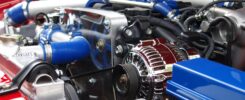German manufacturers are renowned for their precision engineering and commitment to quality, which extends into the realm of aviation. The use of aircraft parts from German manufacturers offers numerous advantages that significantly contribute to flight safety and operational efficiency. In this article, we will explore how these high-quality components enhance safety in aviation through four key aspects.
Superior Engineering and Precision
German manufacturers are globally recognized for their exceptional engineering standards and precision, particularly in the production of aviation parts. This reputation for meticulous craftsmanship and rigorous quality control is crucial in the aviation industry, where the reliability and performance of each component can significantly impact flight safety. German aviation parts are renowned for their ability to meet and exceed the highest specifications, providing a level of reliability that is indispensable for safe and efficient aircraft operations.
At the heart of German engineering excellence is a commitment to precision. Each aircraft part, from landing gear and engines to avionics systems, is meticulously crafted to ensure that it meets stringent safety and performance standards. The use of advanced manufacturing technologies and rigorous quality control processes means that these components are produced with an extraordinary level of accuracy. This precision is not merely a matter of technical prowess but a fundamental requirement in aviation. Components must function flawlessly under a range of demanding conditions, including extreme temperatures, high pressures, and continuous operational stress.
The meticulous attention to detail inherent in German manufacturing processes reduces the likelihood of defects and deviations in aircraft parts. By adhering to precise tolerances and specifications, German manufacturers minimize the risk of operational failures, which is critical in maintaining the safety and reliability of aircraft. For example, components such as landing gear must endure significant forces during takeoff and landing, while engines operate under high stress and variable conditions. Ensuring that these parts are built to exacting standards helps prevent unexpected malfunctions that could compromise flight safety.
In addition to reducing the risk of failure, the precision engineering of German aviation parts enhances overall operational efficiency. Reliable components lead to fewer maintenance issues and longer intervals between repairs, which translates into lower operational costs and improved aircraft availability. For instance, high-precision components in engines and avionics systems contribute to smoother and more predictable performance, allowing for better flight planning and management. This efficiency is not only beneficial for operators but also contributes to a safer flying experience for passengers and crew.
Advanced Materials and Durability
The use of advanced materials is a hallmark of German engineering, contributing to the durability and performance of aircraft parts. German manufacturers often employ high-strength materials such as titanium alloys, carbon composites, and specialized polymers. These materials are selected for their ability to withstand extreme stresses, temperatures, and environmental conditions, ensuring long-lasting performance. For example, German-made propellers and engine components are crafted from materials that provide excellent resistance to wear and fatigue. This durability is crucial in aviation, where components are subjected to continuous stress and varying conditions. By using high-quality materials, German manufacturers enhance the lifespan of aircraft parts, which in turn reduces the frequency of replacements and maintenance, contributing to overall flight safety.
Moreover, the reliability of German aviation parts is supported by a robust framework of safety standards and regulatory compliance. German manufacturers adhere to international aviation standards, ensuring that their components are subjected to thorough testing and certification processes. These rigorous procedures validate the safety and performance of the parts, providing assurance that they meet the highest industry requirements. The commitment to meeting these standards reflects the manufacturers’ dedication to maintaining the safety and integrity of the aviation systems in which their components are used. In conclusion, the precision and quality associated with German aviation parts play a pivotal role in enhancing flight safety. The meticulous engineering, advanced manufacturing technologies, and adherence to stringent safety standards ensure that these components provide reliable performance and reduce the risk of operational failures. By investing in aircraft parts from German manufacturers, operators benefit from a proven track record of excellence and gain confidence in the safety and efficiency of their aircraft. The impact of German engineering on aviation safety underscores the importance of precision in maintaining the highest standards of performance and reliability in the industry.
Rigorous Testing and Certification
In the aviation industry, the safety and reliability of aircraft depend heavily on the quality of their components. German manufacturers are renowned for their commitment to rigorous testing and certification processes, which play a crucial role in maintaining the highest standards of safety and performance in aviation parts. This meticulous approach to testing and certification ensures that only the most reliable and effective components are approved for use, contributing significantly to overall flight safety. German aviation parts undergo a comprehensive testing regime that includes both simulations of real-world conditions and rigorous stress tests. These tests are designed to evaluate every aspect of a component’s performance, reliability, and durability under various operational scenarios. Simulations replicate the diverse conditions that parts may encounter during flight, including extreme temperatures, high pressures, and operational stresses. By subjecting components to these simulated conditions, manufacturers can assess their ability to perform consistently and reliably throughout their operational life.
Stress tests are another critical component of the testing process. These tests involve subjecting parts to conditions beyond their normal operating limits to determine how they respond to extreme situations. This rigorous approach helps identify potential weaknesses or failure points before the components are approved for use. By understanding how parts behave under stress, manufacturers can make necessary adjustments to enhance their durability and performance, ensuring that they meet or exceed safety standards. The certification process for German aviation parts is equally stringent. Once a component has passed initial testing, it undergoes thorough inspections and validations by recognized aviation authorities. These authorities are responsible for ensuring that all aviation parts meet the required safety and performance criteria set forth by industry regulations. The certification process includes detailed reviews of the component’s design, manufacturing processes, and testing results. Only components that have successfully passed these evaluations are granted certification and approved for use in aircraft. This rigorous approach to certification ensures that only the highest quality components are used in aviation. For operators and pilots, this translates into increased confidence in the safety and reliability of their aircraft. Knowing that each part has undergone extensive testing and validation provides reassurance that it will perform as expected under a wide range of conditions. This confidence is crucial for maintaining the safety of both passengers and crew, as well as for the overall operational efficiency of the aircraft.
Innovation and Technological Advancement
German manufacturers are at the forefront of innovation and technological advancement in the aviation industry. The continuous investment in research and development leads to the creation of cutting-edge aviation parts that incorporate the latest technological advancements. Innovations such as advanced avionics systems, enhanced aerodynamics, and improved fuel efficiency are examples of how German engineering contributes to safer and more efficient flights.
For instance, advancements in avionics from German manufacturers provide pilots with more accurate navigation tools, real-time data, and enhanced situational awareness. These innovations improve the pilot’s ability to make informed decisions and respond to changing conditions, ultimately enhancing flight safety. The integration of new technologies into aircraft parts ensures that they not only meet current safety standards but also push the boundaries of what is possible in aviation.
By choosing aviation parts from German manufacturers, operators benefit from this extensive testing and certification process. The commitment to quality and safety inherent in German manufacturing practices means that these components are among the most reliable and well-engineered available. The thorough evaluation of each part ensures that it meets the highest industry standards, contributing to the overall safety and effectiveness of the aircraft. The rigorous testing and certification processes applied to German aviation parts underscore the commitment to excellence and safety that defines German engineering. Through detailed simulations, stress tests, and thorough inspections by aviation authorities, German manufacturers ensure that their components meet the highest safety and performance criteria. This comprehensive approach not only enhances the reliability of aircraft parts but also provides operators with the assurance that they are using components that have been extensively tested and validated for safety. The dedication to rigorous testing and certification is a key factor in the exceptional safety and performance of German aviation parts, contributing to safer and more reliable flights.

